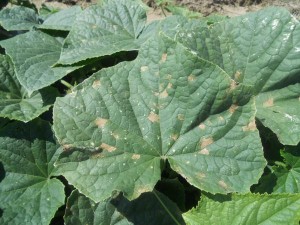Airborne Vegetable Diseases of Concern in NC: Cucurbit Downy Mildew & Tomato / Potato Late Blight
go.ncsu.edu/readext?414818
en Español / em Português
El inglés es el idioma de control de esta página. En la medida en que haya algún conflicto entre la traducción al inglés y la traducción, el inglés prevalece.
Al hacer clic en el enlace de traducción se activa un servicio de traducción gratuito para convertir la página al español. Al igual que con cualquier traducción por Internet, la conversión no es sensible al contexto y puede que no traduzca el texto en su significado original. NC State Extension no garantiza la exactitud del texto traducido. Por favor, tenga en cuenta que algunas aplicaciones y/o servicios pueden no funcionar como se espera cuando se traducen.
Português
Inglês é o idioma de controle desta página. Na medida que haja algum conflito entre o texto original em Inglês e a tradução, o Inglês prevalece.
Ao clicar no link de tradução, um serviço gratuito de tradução será ativado para converter a página para o Português. Como em qualquer tradução pela internet, a conversão não é sensivel ao contexto e pode não ocorrer a tradução para o significado orginal. O serviço de Extensão da Carolina do Norte (NC State Extension) não garante a exatidão do texto traduzido. Por favor, observe que algumas funções ou serviços podem não funcionar como esperado após a tradução.
English
English is the controlling language of this page. To the extent there is any conflict between the English text and the translation, English controls.
Clicking on the translation link activates a free translation service to convert the page to Spanish. As with any Internet translation, the conversion is not context-sensitive and may not translate the text to its original meaning. NC State Extension does not guarantee the accuracy of the translated text. Please note that some applications and/or services may not function as expected when translated.
Collapse ▲
With typically cool and rainy periods of weather throughout the growing season, all High Country growers should scout for and take steps to prevent diseases on all crops. While many plant diseases originate in soils and can be managed by preventive strategies such as crop rotation, many Downy Mildews travel here from warmer climates (generally, but not always points south of us) on weather systems, Cucurbit and Grape Downy Mildews, and Tomato/Potato Late Blight outbreaks are frequently observed observed in Georgia, South Carolina, or even Maryland before reaching western NC. With airborne plant pathogens ‘on the march’ sometimes earlier than usual, it makes sense to track these diseases as they move across the southeast in a given growing season, especially when conditions on the ground favor crop disease development here. See these archived (i.e. – NOT CURRENT) updates for examples of how NCSU’s Plant Pathology Extension Specialists track the movement of these diseases:
https://plantpathology.ces.ncsu.edu/2016/06/cucumber-downy-mildew-reported-in-north-carolina/
https://plantpathology.ces.ncsu.edu/2016/05/scout-potatoes-for-late-blight-due-to-recent-reports/
When growing susceptible crops such as Bunch Grapes (Winegrapes, etc.), Tomatoes, Winter Squash, etc., check the Plant Pathology website throughout the growing season, or call your Extension Agent. For scouting and spray recommendations for particular farm and crops in Ashe and Watauga Counties, whether conventional or organic, contact Agriculture Agent Richard Boylan at rjboylan@ncsu.edu or by calling Extension at 828-264-3061.




